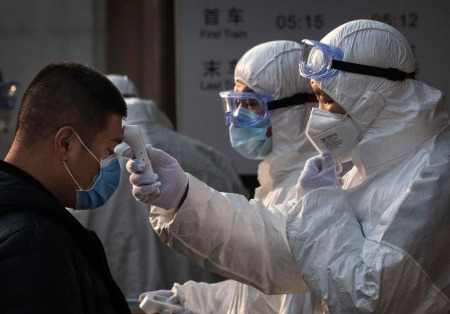Chinese spies who hacked COVID-19 research also behind pastor's imprisonment

Two Chinese cyber thieves accused of targeting U.S. firms involved in coronavirus research also hacked the private emails of a Christian house pastor and shared them with communist officials, leading to his arrest.
Department of Justice spokesperson Kerri Kupec told Martha MacCallum on Fox News' “The Story” Tuesday night that Li Xiaoyu and Dong Jiazhi, who worked in tandem with China’s state intelligence bureau to steal hundreds of millions of dollars in sensitive information from companies around the world, also wreaked havoc within their own country.
“For instance, the Chinese government shut down a Christian house church, and within a week, these two individuals were hacking into this Chinese Christian pastor’s email account, gathered those emails, and submitted it to the Chinese government,” Kupec said. “The Chinese government then arrested that pastor.”
“So these two individuals are doing quite the damage,” she added.
On Tuesday, U.S. prosecutors charged the two Chinese nationals for their alleged involvement in the massive global hacking operation that spanned over a decade. Officials described the suspects as a "blended threat" who sometimes worked on behalf of China’s spy services and sometimes to enrich themselves.
According to the 11-count indictment, unsealed on Tuesday, the hackers gave China's Ministry of State Security the personal data of dissidents, pastors, and human rights activists in the United States, China and Hong Kong.
“For example, they provided the MSS with email accounts and passwords belonging to a Hong Kong community organizer, the pastor of a Christian church in Xi’an, and a dissident and former Tiananmen Square protestor,” the indictment reads. “The Defendants also stole email account contents of obvious interest to the PRC Government, such as ... emails belonging to a Chinese Christian ‘house’ … pastor in Chengdu, who was later arrested by the PRC government; and emails from a U.S. professor and organizer, and two Canadian residents, who advocated for freedom and democracy in Hong Kong.”
Li and Dong “reacted quickly” to China’s “perceived desires,” the indictment notes, targeting the Chengdu house pastor “just days after the provincial government banned his church.”
The indictment also alleges the former engineering students stole hundreds of millions of dollars' worth of trade secrets, intellectual property, and other valuable business information. Specifically, they stole terabytes of data from high-technology companies around the world, including the U.S.
Recently, the pair targeted the networks of over a dozen U.S. biomedical research firms in Maryland, Massachusetts, and California that are developing vaccines and treatments for COVID-19.
The indictment says the two men recently “researched vulnerabilities in the networks of biotech and other firms publicly known for work on covid-19 vaccines, treatments, and testing technology.”
“China has been stealing this kind of research for years and years and years, but the Department of Justice really drew a line in the sand today and saying look, this has got to stop. This is enough and we will hold you accountable,” Kupec said Tuesday.
The indictment is part of the Justice Department’s China initiative, launched in 2018, notes The Washington Post. The initiative prioritizes countering Chinese national security threats in line with the administration’s national security strategy.
Earlier this year, Open Doors USA CEO David Curry warned that China, under President Xi Jinping, was building a "blueprint for persecution" as Christians have been under constant surveillance.
“Its implications are not just for Christians within China but for every country and for religious freedom generally,” Curry said. “Let me put it together. It is like a puzzle. The pieces are there but it is not until you put it together that you see it clearly. When you see it clearly, it is frightening.”
“I saw with my own eyes the surveillance on the street but also in the churches, watching their congregation,” he said. “Facial scans when you come in and then tracking you and generating reports [with] assumptions built into their artificial intelligence system that is tracking Christian behavior.”
Curry said that the more often a person is seen going to church, the more often they are to be labeled a “radical.”
“They are shutting down house churches at a massive rate — 5,596 churches shut down, many because they refuse to put surveillance cameras up to watch their congregation.”
In April, several members of China’s heavily persecuted Early Rain Covenant Church were arrested by communist authorities for participating in an online Easter worship service on Zoom and ordered to cease all religious activity.
China is ranked No. 23 on Open Door USA’s World Watch List of 50 countries where Christians face the most persecution.





















